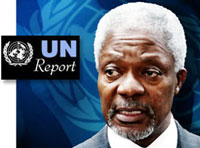
UNITED NATIONS (FinalCall.com) – In 1964, the Group of 77 (G-77) plus China was formed at the United Nations, according to one of its founding fathers, Tanzanian president, Julius Kambarage “Mwalimu” Nyerere, to create an opportunity for developing nations to be prime movers of their own destiny.
“The Group of 77 was created to change the status quo, which was skewed in favor of the developed countries,” Mr. Nyerere stated after it’s formation.
There are 132 nations now, and they are battling today at the UN accusing rich developed nations of trying to use money power to marginalize developing nations. The chairman of the G-77 plus China, South Africa’s ambassador to the UN, Dumisani Shadrack Kumalo, said the affluent would not be allowed to run the UN the way they want.
At issue is the reforming of the UN and a demand by the United States, United Kingdom, Japan, Germany and other nations that they must have a greater say in running the organization because they contribute the lion’s share of the UN’s general budget.
“We thank them for paying 82 percent of the budget, but we are saying that doing so does not entitle them to have a larger voice and to then decide for the rest of the membership, because that goes against the Charter,” Amb. Kumalo stated during his press conference on Apr. 26.
The South African diplomat said there were sharp differences between the rich and poor on the way the UN should be reformed and accused developed nations of not trying to engage developing states in resolving issues.
The strong statement by the G-77 plus China also came in the context of a resolution that the group placed before the General Assembly’s budgetary committee seeking information on reform proposals by Secretary-General Kofi Annan, which would take away some financial and personnel powers from the 191-member General Assembly and give them to the secretary-general.
In March, Mr. Annan introduced a 33-page document that contained his vision on overhauling the UN bureaucracy. He is seeking more financial oversight, staff buyouts, a modern information system and flexibility in assigning staff and resources, at a cost of $500 million.
Noting that the UN Charter granted members equality in running the organization, Amb. Kumalo asserted that the UN is not a private corporation in which those contributing most to the budget could have the greatest input in decision-making. He recalled that, during the last debate on the budget (Dec. 2005), the U.S. Japan and the European Union had said they were putting a spending cap on the UN, because they wanted it reformed according to their wishes and, if that was not done, the UN would have no money by June 30. That was the sword hanging over the world body.
The General Assembly adopted a $3.79 billion budget for 2006-2007, but limited first-year expenditures by the secretary-general, while the discussion of reforms continues.
Reuters reported on Apr. 27 that the Bush administration and others tied progress on management reform to their approval of refinancing the UN budget on June 30. To end the diplomatic deadlock back in December, the General Assembly agreed that only $950 million of the $3.79 billion could be appropriated until June.
“There is a sharp disagreement on what kind of reform is needed and for what purpose,” writes Jim Paul of the Global Policy Forum on their website Globalpolicyforum.com. “The UN has been reformed on average every eight years. But the pace has quickened, for Washington has issued a sober warning that the UN must reform or die,” Mr. Paul writes.
An 11-page resolution, written by South Africa and circulated on Apr. 26, asked the secretary-general to submit new reports to the next General Assembly session in September to explain his reform proposals in greater detail. The U.S. indicated that they were unwilling to discuss the resolution, while developing nations have refused to withdraw it.
Amb. Kumalo told reporters that he had never seen the Group of 77 as solid as it was now, commenting, “It’s a very defining moment for the United Nations.”












